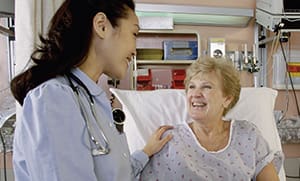Special Instructions for Children

At Memorial Hospital, we work hard to meet the special needs of children and create a relaxed, comfortable environment. It is important for us to work as a team in providing the best possible medical care and psychological preparation for your child. Please do not hesitate to ask us questions.
Your child will have many questions and concerns about surgery. Reassure your child as much as possible. Children’s concerns are very real and should be answered as honestly and simply as possible.
Many families find it difficult to talk to their child about an upcoming surgery. We suggest that you give your child honest, age-appropriate information, rather than leave them to worry or be caught off guard.
Involve your child in preparations, such as shopping for popsicles or packing a few favorite toys to take to the hospital. Using a toy doctor’s kit or drawing pictures of the hospital can help your child express some of their thoughts.
Night Before Surgery
Be sure your child has a well-balanced dinner the night before surgery. Provide plenty to eat and drink just before the food and drink cut-off time specified by your doctor.
After the cut-off time, be sure that your child has absolutely nothing to eat or drink—not even hard candy, gum, water, or ice. For your child’s safety, it is important that the stomach is completely empty prior to the induction of anesthesia. Serious complications could arise with even small amounts of food or water in the stomach. Because children forget and may help themselves to food, they will need to be closely watched. If your child accidentally eats or drinks anything after the cut-off time, you must notify the nursing staff so that proper precautions can be taken.
It is important that your child get plenty of rest before surgery. Try to keep activities low key. Be sure your child bathes and washes their hair. Your child should use freshly laundered towels and pajamas. They should also sleep on clean sheets. This reduces the chances of post-operative infection and helps your child feel better while recovering.
The Day of Surgery
Sometimes parents are reluctant to eat when their child cannot, but in order to handle the day’s activities and attend to your child’s needs, you will need energy. We suggest you eat a nutritious meal before waking your child.
- Brush your child’s teeth, but do not allow them to swallow any water.
- Your child should wear loose, freshly laundered, and comfortable fitting clothes.
- Leave all jewelry at home.
- Your child’s nurse will explain the preparation process and ask you for some health information.
- Please plan to spend most of the day at the hospital.
- Your child should take only those medications as instructed with a sip of water in the morning. Diabetic medications should NOT be taken the morning of surgery, unless instructed by the surgeon or anesthesiologist.
- Surgery times are approximate and may be earlier or later depending on the entire surgery schedule.
Parents/guardians will be with the child at all times before going into the operating room. A parent or guardian must stay at the hospital while surgery is being performed. In addition, parents or guardians must wait in the Outpatient Surgery Visitor’s Lounge at all times during and after surgery. If you must leave this area, even for a minute, please tell the receptionist where you will be.
Pain Relief
Your child has the same right to pain relief as grownups. As a parent, you can play a big part in helping your child.
How to talk about pain
Tell the nurse if you think your child is in pain. A hint may be if your child is acting differently than usual. Also, tell the nurse about any words your child might say or other ways they might show they are in pain. This will help your child’s nurse and doctor.
Your child’s nurse will watch for changes that your child is in pain. If your child is old enough, the nurse might ask him/ her to look at a group of faces that measure pain.
Pain relief
- Medicines: Infants and children are given almost the same medicines for pain as adults, just in different amounts.
- Being held or rocked
- A favorite blanket
- Teddy bears or other soft toys to cuddle
- Pacifiers
- Mobiles
- Music, lullabies
- Toys, TV, games, or other things that might distract your child
- Sucrose liquid

Patient Care and Satisfaction
We want you to have the best experience possible at Memorial Hospital Belleville. Learn more about our programs to ensure patient satisfaction.

